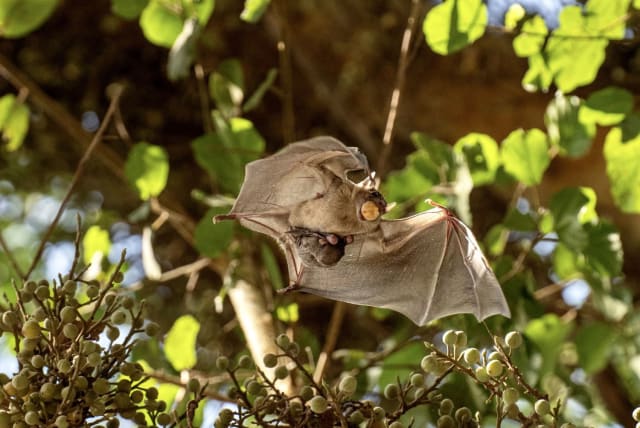Leave bats alone for environmental conservation, experts advise

To prevent future pandemics, leave the bats alone – even though they are a reservoir for many viruses, conservation experts say.
Despite the fact that bats (Chiroptera) are a reservoir for a large variety of potentially harmful viruses, wildlife conservation experts recommend “leaving them alone” and letting them have the habitats they need undisturbed.
Writing in The Lancet Planetary Health, experts at Cornell University in Ithaca and the Wildlife Conservation Society (WCS) in the Bronx, New York, make the case that pandemic prevention requires a global agreement in which whereby humanity agrees not to interfere with, chase away or kill off the flying mammals.
“Like the SARS coronavirus outbreak of 2003, the COVID-19 pandemic can be traced back to a bat virus,” wrote Dr. Susan Lieberman, WCS’s vice president for international policy. “Whether someone handled or ate an infected bat or was exposed to a bat’s bodily fluids in a cave or some other way or was exposed to another animal that had been infected by a bat, we will quite likely never know. Even a virus released via a lab accident would still have originally come from a bat. But we don’t need to know all of the details in order to act.”
What disease to bats carry?
Among the viruses with which bats can infect other species, including people, are rabies, Marburg filoviruses, Hendra and Nipah paramyxoviruses, coronaviruses such as Middle East Respiratory Syndrome (MERS) Coronavirus; fruit bats are strongly believed to be a source of Ebola viruses as well.
If an ounce of prevention is indeed worth a pound of cure, then the authors emphasize that humanity simply must take the most basic, common-sense steps to lower our risk of incurring another pandemic at the interface where dangerous viruses can actually move from animals into people.
“In a globalized world with eight billion people, we can no longer ignore our interconnectedness with the wildlife and ecosystems around us,” Lieberman wrote under the title “An Immediate Way to Lower Pandemic Risk: (Not) Seizing the Low-Hanging Fruit (Bat)” along with four other experts in New York State. We must change humanity’s relationship with nature if we want to prevent the next pandemic of zoonotic origin, and that can start with bats…Preventing a pandemic is still easier and much less expensive than dealing with one.”
They continued that “simply put, humanity must change its broken relationship with nature, specifically wildlife and bats in particular. The costs of implementing the human behavioral changes we need are insignificant compared to the costs of another global pandemic. which could be even more devastating.”
Getting humanity to work collaboratively at a global scale underpins most of the existential challenges we face, from climate change and environmental pollution to biodiversity loss and ecosystem collapse. this at a time when earnest collaboration even at local scales often seems elusive,” added Cornell Prof. (of wildlife health and health policy) Steven Osofsky, the study’s lead author. “However, if we can actually stop hunting, eating and trading bats, stay out of their caves, keep livestock away from areas where bats are concentrated and if we can stop deforesting, degrading or even start restoring their natural habitats, we can indisputably lower the chances of another pandemic.”
The authors stressed that allowing bats to survive and thrive will also pay billions of dollars in dividends in the form of the ecosystem services that bats provide, including the control of mosquitos and other harmful insects, as well as pollination of a wide array of important crops. The US Department of Agriculture notes that a single small bat can eat up to 1,000 insects in an hour. In addition, bats pollinate more than 700 species of plants, many of which we use for food or medicine.
The ideas that have been put forward by the World Health Organization (WHO) and other key multilateral and philanthropic institutions – with billions of dollars being committed in the name of pandemic prevention – “have thus far been largely focused on preparedness and response, not prevention,” they wrote.
The authors conclude that “humanity’s relationships with other kinds of animals indeed merit close scrutiny, but respecting bats and the habitats they need is an important better-late-than-never message now that we’ve passed the third anniversary of the COVID-19 pandemic.”
Jerusalem Post Store
`; document.getElementById("linkPremium").innerHTML = cont; var divWithLink = document.getElementById("premium-link"); if (divWithLink !== null && divWithLink !== 'undefined') { divWithLink.style.border = "solid 1px #cb0f3e"; divWithLink.style.textAlign = "center"; divWithLink.style.marginBottom = "15px"; divWithLink.style.marginTop = "15px"; divWithLink.style.width = "100%"; divWithLink.style.backgroundColor = "#122952"; divWithLink.style.color = "#ffffff"; divWithLink.style.lineHeight = "1.5"; } } (function (v, i) { });

